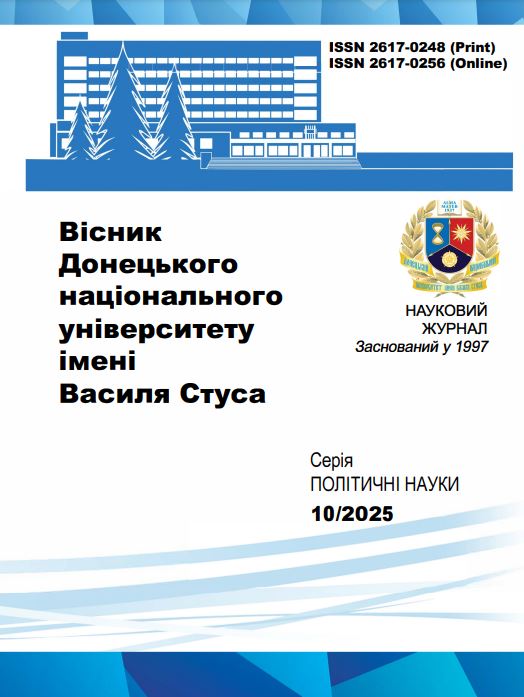«World government»: concept, goals, interdisciplinary discourse
DOI:
https://doi.org/10.31558/2617-0248.2025.10.9Keywords:
«world government», power, state, global governance, world order, political goals, justiceAbstract
The article explores the concept of «world government» through the prism of its main goals. The works of philosophers, public figures and scientists from various fields of knowledge are analyzed. Four contexts of understanding «world government» are conditionally distinguished, important for modern research – historical and philosophical, economic, legal and political. The political goals of the «world government» are revealed: 1) World security and guarantee of peace: conflict prevention; management of world natural resources. 2. Global human equality: reduction of economic inequality; global control over calculation systems. 3. Unified global control over the development and use of technologies. 4. Ecological world security. To clarify the understanding of the concept of «world government», a teleological approach is applied. Based on the works of philosophers, economists, lawyers and politicians, it is shown that the term «world government» is mentioned in the context of world order, world governance, global governance. It is characterized as a supranational institution of power, a body of political power capable of governing all the peoples of the world. It is found that the concept of «world government» is used in relation to various forms of global governance, some international organizations and hypothetical models of a single power. The main goals of the "world government" are highlighted, which, according to supporters, indicate the need for its creation: reducing the number of conflicts; preventing crises in various areas; stable world order; lasting peace on the planet; preventing nuclear war; ensuring economic equality; economic stability; rational management of resources; fair distribution of resources; more effective response to unforeseen circumstances and uncontrolled development of technologies (artificial intelligence); effective functioning of international law; protection of human rights at the global level. Attention is focused on the need to study the arguments of critics of the need for the existence of a «world government».
References
Шепєлєв М.А. Глобалізація управління як мегатенденція сучасного світового розвитку: монографія. Київ: Вид-во Генеза, 2004. 312 с.
Ялі М.Х. Поняття та підходи до тлумачення світового порядку. Дослідження світової політики: Збірник наукових праць. ІСЕМВ НАН України. 2009. Вип. 48. С. 160–171.
Рябека О. Г. Таємниця світового уряду: погляд на генезис і становлення. Вісник Харківського національного педагогічного університету імені Г. С. Сковороди. 2016. Вип. 47(1). С. 24–36.
World Government (first published Mon Dec 4, 2006; substantive revision Tue Jan 5, 2021). Stanford Encyclopedia of Philosophy. URL: https://plato.stanford.edu/entries/world-government/#Conc
Аліг’єрі Д. Монархія. Київ: Дух і Літера, 2008. 240 с.
Kant I. Zum ewigen Frieden: Ein philosophischer Entwurf. Leipzig: F. Meiner, 1923. 150 p.
Wells H.G. The Open Conspiracy. London: Penguin Books, 1928. 320 p.; Wells H.G. The New World Order. A Project Gutenberg of Australia eBook. First published by Secker & Warburg, London. 1940. URL: https://gutenberg.net.au/ebooks04/0400671h.html#chap01
Einstein A. World Government and the Threat of Nuclear War. New York: Harper & Row, 1954. 220 p.
Russell B. Common Sense and Nuclear Warfare. New York: Simon and Schuster, 1959. P. 10–15.
Harari Y.N. Sapiens: A Brief History of Humankind. New York: Harper, 2015. 416 p.
Boulding K. Stable Peace. Austin: University of Texas Press, 1978. 280 p.
Cooper R. Economic Policy in an Interdependent World. Cambridge: MIT Press, 1986. 400 p.
Kelsen H. Peace Through Law. Chapel Hill: University of North Carolina Press, 1944. 360 p.
Louis L. État fédéral et confédération d'États, Paris: Marchal et Billard, 1896. 839 p.
Woolf L. International Government. New York: Brentano's, 1916. 412 p.
Muller R. New Genesis: Shaping a Global Spirituality. Washington: Doubleday, 1982.192 p.
Talbott S. The Great Experiment: The Story of Ancient Empires, Modern States, and the Quest for a Global Nation. New York: Simon & Schuster, 2008. 496 p.
Lovelock J. The Revenge of Gaia: Earth’s Climate Crisis and the Fate of Humanity. London: Penguin Books, 2006. 288 p.

